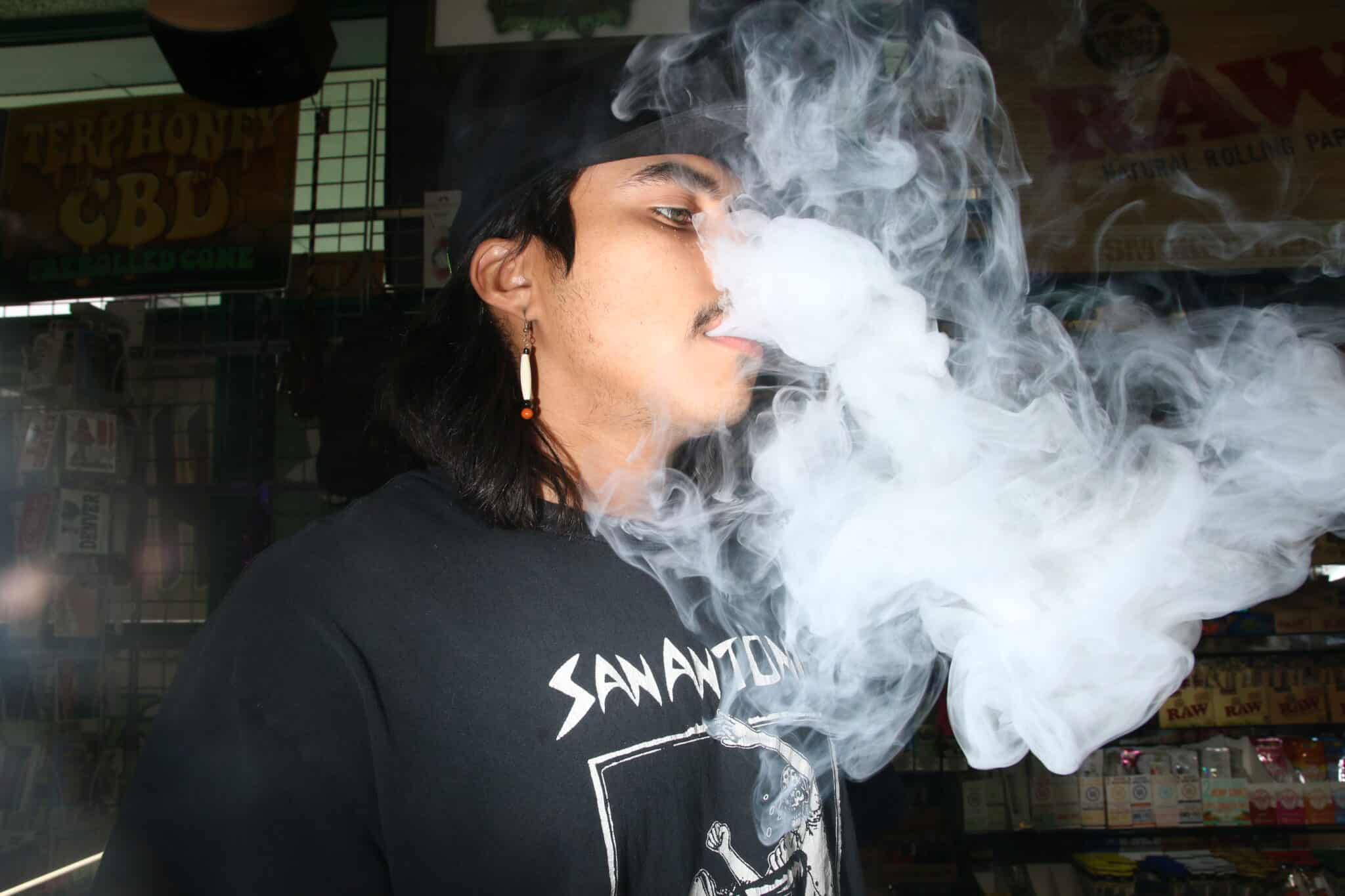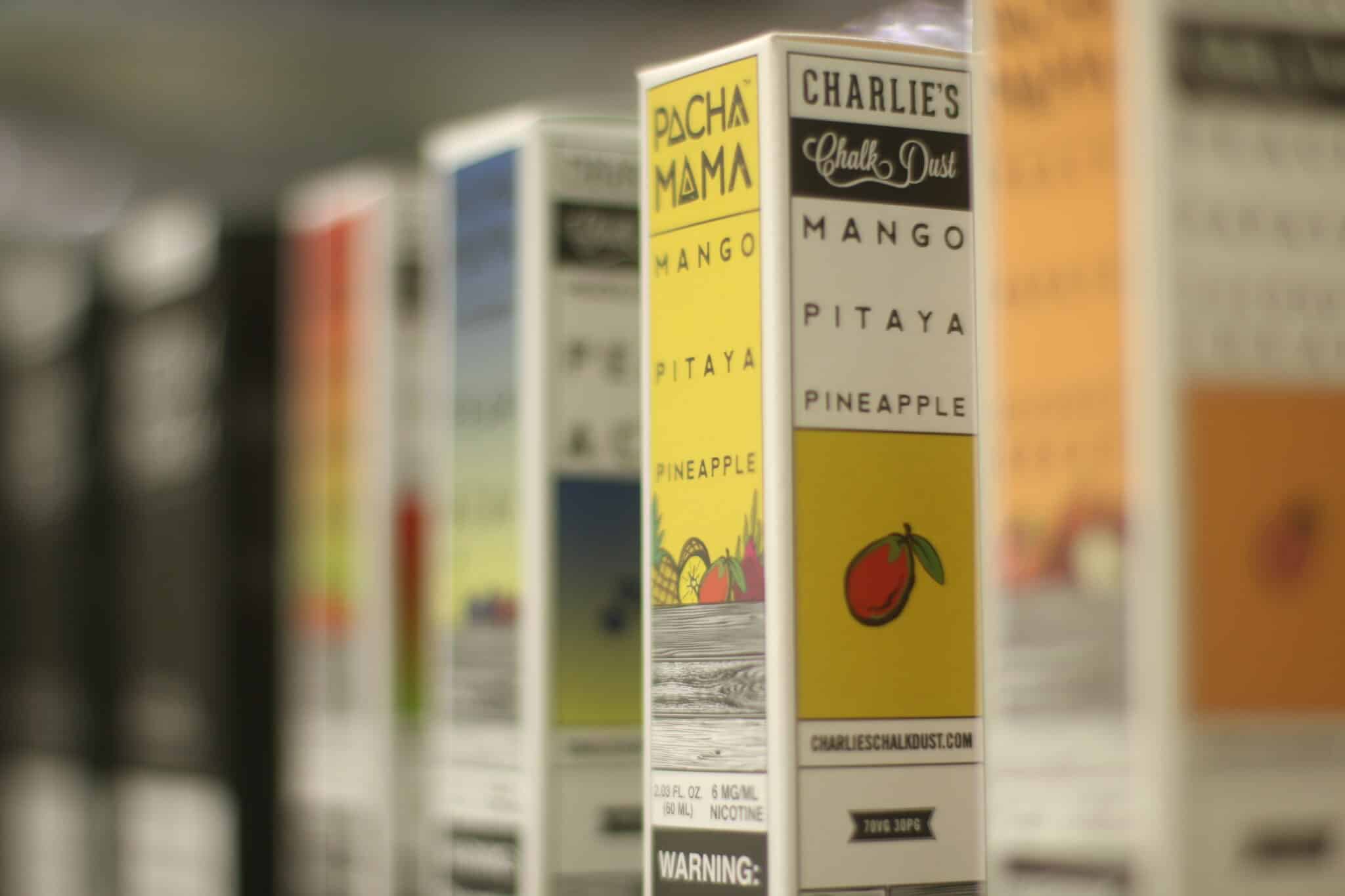
Luciano Neel, an assistant manager at Myxed Up Creations at the corner of Ivy Street and East Colfax Avenue, blows a vapor cloud. (BusinessDen file)
Denver is poised to ban the sale of most flavored tobacco and nicotine products, but it has pushed back the likely start date.
The City Council on Monday approved the first reading of a measure that bans the sale of flavored tobacco and nicotine products that have not been approved by the U.S. Food and Drug Administration to help people quit smoking. That would include certain flavored cigars, vaping products and chewing tobacco.
Council members rejected two proposed amendments. One, suggested by Councilmen Chris Herndon and Kevin Flynn, would have exempted menthol-flavored products. The second, suggested by Councilwoman Kendra Black, would have allowed flavored tobacco and nicotine product sales only in age-restricted and specialty vaping stores.
Council members did agree to move the start date of the new rules to 2023. The previous plan was to start the ban next July.
“We know reducing access to these products reduces usage by youth,” said Councilwoman Amanda Sawyer, who introduced the bill with Councilwoman Deborah Ortega. “That’s why we have put an annual reporting requirement in the bill … so that if in the future we need to make changes, we can.”
There are some exemptions to the proposed ban. Hookah lounges can continue to operate and the sale of tobacco used in those devices can continue to be sold. Also exempted is the sale of premium hand-rolled cigars and pipe tobacco.
The council approved the first reading 12-1, with Herndon voting no. Herndon said not exempting menthol while allowing hookah and premium cigars to bypass the regulations is unfair.
“There are health effects of cigarettes, absolutely,” Herndon said. “But you know what? There are health effects of premium cigars. There are health effects of a hookah. So how this body has exempted those and then suddenly chosen to affect menthol … If it’s impacting one segment greater than others, we should acknowledge and have a conversation about that.”
The council will likely adopt the measure at a second reading next Monday before it is sent to the mayor for a signature.
Brian Fojtik, a consultant for the National Association of Tobacco Outlets, said during the meeting that youth tobacco smoking has been dropping significantly over the last few decades. He said most of the time, underage people obtain tobacco and nicotine products from older family members or friends.
“Even more concerning are three recently published peer-reviewed studies demonstrating that when enacted, these flavor bans have resulted in increased smoking among youth and young adults,” Fojtik said. “That would be a horrible outcome from a public health perspective.”
The ordinance calls for violators to receive a warning for the first offense. Subsequent offenses could lead to a store losing its tobacco retail license.
Edgewater, Boulder, Aspen and Glenwood Springs have already passed bans on the sale of flavored tobacco.
The bill came forward from Sawyer after her 12-year-old daughter was reported by school officials seeking to purchase flavored tobacco or nicotine products via the app TikTok.
Michel Holien, manager of preventative services for Denver Public Schools, told a council committee two weeks ago that there has been an “explosion” of vaping incidents at schools.
“Our students really think vaping is safe because they really don’t know what’s in these products,” she said. “They don’t realize they’re being exposed to carcinogenic chemicals. As you move forward with this policy, please do not exempt age-restricted stores or menthol.”

Luciano Neel, an assistant manager at Myxed Up Creations at the corner of Ivy Street and East Colfax Avenue, blows a vapor cloud. (BusinessDen file)
Denver is poised to ban the sale of most flavored tobacco and nicotine products, but it has pushed back the likely start date.
The City Council on Monday approved the first reading of a measure that bans the sale of flavored tobacco and nicotine products that have not been approved by the U.S. Food and Drug Administration to help people quit smoking. That would include certain flavored cigars, vaping products and chewing tobacco.
Council members rejected two proposed amendments. One, suggested by Councilmen Chris Herndon and Kevin Flynn, would have exempted menthol-flavored products. The second, suggested by Councilwoman Kendra Black, would have allowed flavored tobacco and nicotine product sales only in age-restricted and specialty vaping stores.
Council members did agree to move the start date of the new rules to 2023. The previous plan was to start the ban next July.
“We know reducing access to these products reduces usage by youth,” said Councilwoman Amanda Sawyer, who introduced the bill with Councilwoman Deborah Ortega. “That’s why we have put an annual reporting requirement in the bill … so that if in the future we need to make changes, we can.”
There are some exemptions to the proposed ban. Hookah lounges can continue to operate and the sale of tobacco used in those devices can continue to be sold. Also exempted is the sale of premium hand-rolled cigars and pipe tobacco.
The council approved the first reading 12-1, with Herndon voting no. Herndon said not exempting menthol while allowing hookah and premium cigars to bypass the regulations is unfair.
“There are health effects of cigarettes, absolutely,” Herndon said. “But you know what? There are health effects of premium cigars. There are health effects of a hookah. So how this body has exempted those and then suddenly chosen to affect menthol … If it’s impacting one segment greater than others, we should acknowledge and have a conversation about that.”
The council will likely adopt the measure at a second reading next Monday before it is sent to the mayor for a signature.
Brian Fojtik, a consultant for the National Association of Tobacco Outlets, said during the meeting that youth tobacco smoking has been dropping significantly over the last few decades. He said most of the time, underage people obtain tobacco and nicotine products from older family members or friends.
“Even more concerning are three recently published peer-reviewed studies demonstrating that when enacted, these flavor bans have resulted in increased smoking among youth and young adults,” Fojtik said. “That would be a horrible outcome from a public health perspective.”
The ordinance calls for violators to receive a warning for the first offense. Subsequent offenses could lead to a store losing its tobacco retail license.
Edgewater, Boulder, Aspen and Glenwood Springs have already passed bans on the sale of flavored tobacco.
The bill came forward from Sawyer after her 12-year-old daughter was reported by school officials seeking to purchase flavored tobacco or nicotine products via the app TikTok.
Michel Holien, manager of preventative services for Denver Public Schools, told a council committee two weeks ago that there has been an “explosion” of vaping incidents at schools.
“Our students really think vaping is safe because they really don’t know what’s in these products,” she said. “They don’t realize they’re being exposed to carcinogenic chemicals. As you move forward with this policy, please do not exempt age-restricted stores or menthol.”

